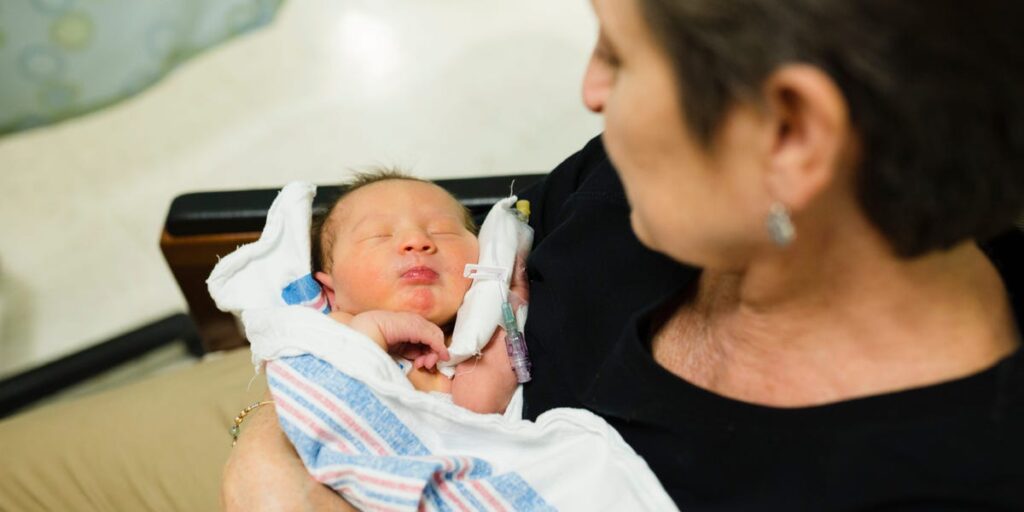- My daughter asked me to be in the delivery room with her for the birth of my first grandchild.
- I was excited, but I was also worried about overstepping.
- I made sure she knew I was there to support her, but didn’t weigh in on any decisions.
“I’d like you to be there with me.”
There? As in there, in the delivery room?
I had many responsibilities throughout my daughter’s pregnancy. I hid the news in the early days. I loved every name suggestion. I retold my birth stories whenever asked. I planned a baby shower. I accepted that times were changing and prefaced any comments with, “I don’t know if they still do it like this…” When she invited me to support her during delivery, of course I agreed. I would be experiencing the birth of my first grandchild!
I was worried about my role and didn’t want to overstep
Instantly, the second-guessing began. Yes, I had given birth three times, but I had no medical experience. What if I got squeamish and was more of a bother than a help? Could I be a reassuring presence, or would I just annoy her? What about everyone else? How did my son-in-law feel about having me along for the ride? What about his mom, another first-time grandma — would she feel she was being shut out?
Parents-to-be get videos, classes, and tours. I didn’t get much more than the invite and an outline of how she hoped labor would happen. If I had to do it over again, I would ask more questions. What do you see me doing to help you? When will I be there? Early Labor? Active labor? Delivery? Can I do anything for your homecoming? Cook a meal? Clean? Call people? Just like the parents-to-be had an extensive birth plan, I think I needed a more extensive nanny plan.
My nanny plan was as follows: (1) they would call when it was time, and (2) I would come to the birthing center. Beyond that, I didn’t know what else to expect. My most important pre-labor action was reassuring them that no decision is written in stone.
If she changed her mind while I was making the hour drive to the birth center, that was OK. If she decided she wanted me in the waiting room but not the delivery room, that was OK. If she wanted me with her during labor but at some point wanted it to be just her and her husband, that was OK. If she wanted me, then didn’t want me, then wanted me back, that was OK. Emotions change swiftly during the journey to birth, and I wanted her to know she was not locked into any decision because she was worried about my expectations. My nanny plan was to be whatever she wanted.
My biggest job was to support my daughter
Finally, D-Day arrived. As a mom, my instinct was to take charge. I fought that instinct with every bit of strength in me, reminding myself that this was not my experience. On the list of decision-makers, I was at the very bottom. My job was to be a supporter, not a leader. I was like the second-string quarterback — ready for action but hanging back until the coach told me I was needed.
I did small things. I told my daughter she was doing great, and I told my son-in-law he was doing great, too. I was in charge of water. I pushed the hair off her face. I filled in, rubbing her back when my son-in-law briefly left the room. At times, I just needed to be there when she said, “Mom?”
Perhaps the more important things were those I didn’t do. I didn’t weigh in on decisions to be made unless asked. I didn’t even hint that I should be the one to stay when only one support person was allowed. I wasn’t there for every minute, heading for the waiting room or a nearby restaurant to give the couple some time on their own.
Despite remaining on the edges of the action, I wouldn’t trade this experience. I had the opportunity to witness the strength of my daughter and son-in-law, especially when the birth plan was thrown out the window. Their ability to adapt gave me a peek at the parents they would soon be. They were a team, and I felt honored to see this personal part of their relationship.
My own experiences with childbirth are muted by time. I wish someone had told me that supporting your child through birth — the person you strived to protect for a lifetime — was a hundred times harder than giving birth yourself. Like most moms, I would have gladly taken on her pain, but instead, I could only tell her I had confidence in her. The same thing I had been saying since I became a mom: “You can do it.”
After the birth, I was aching to hold my most beautiful grandson in my arms. Instead I said, “I’m going to go and let you become a family together.” And they did.
Read the full article here


